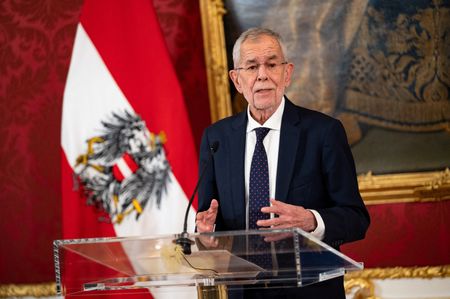By Georgina McCartney
HOUSTON (Reuters) -Oil prices settled down more than $2 a barrel on Friday, posting a weekly decline as investors grappled with a fading Middle East risk premium alongside uncertainty about a potential peace deal in Ukraine.
Brent futures settled down $2.05, or 2.68%, to $74.43 a barrel, while U.S. West Texas Intermediate crude settled down $2.08, or 2.87%, to $70.40.
Brent settled 0.4% down on the week, while U.S. crude futures posted a 0.5% weekly loss.
“There is a risk-off tone here,” said John Kilduff, a partner at Again Capital in New York, also citing relative calm in the Middle East as the Gaza ceasefire holds.
Investors also continued to weigh an uptick in U.S. crude oil stockpiles, reported on Thursday, as seasonal maintenance at refineries led to lower processing, the Energy Information Administration said. [EIA/S]
U.S. energy firms this week added oil and natural gas rigs for a fourth week in a row to the highest level since June, energy services firm Baker Hughes said in a report on Friday.
The oil and gas rig count, an early indicator of future output, rose by four to 592 in the week to February 21.
Traders’ focus was also on oil supply disruption however, capping some losses.
Russia said Caspian Pipeline Consortium oil flows, a major route for crude exports from Kazakhstan, were reduced by 30-40% on Tuesday after a Ukrainian drone attack on a pumping station.
However, oil flows from Kazakhstan’s Tengiz oilfield via CPC are uninterrupted, Russian news agency Interfax reported on Friday, citing Tengizchevroil.
Kazakhstan has pumped record high oil volumes despite damage to its CPC export route via Russia, industry sources said on Thursday. It was not immediately clear how Kazakhstan had been able to pump record volumes.
The Ukrainian drone attack helped support crude prices this week, said Alex Hodes, analyst at StoneX in a note on Friday, also pointing to analysts’ expectation that OPEC+ will delay its production cut once again, in light of crude prices remaining below $80/bbl.
Elsewhere, relations between Ukraine President Volodymyr Zelenskiy and U.S. President Donald Trump deteriorated this week after Zelenskiy criticised U.S. and Russian moves to negotiate a peace deal without Kyiv’s involvement. The rift was widened by Trump comments blaming Ukraine for starting the three-year-old conflict.
Yet after a meeting with Trump’s envoy for the Ukraine conflict on Thursday, Zelenskiy said Ukraine was ready to work quickly to produce a strong agreement with the U.S. on investments and security.
“Trump keeps hammering Ukraine and the market is taking that as a potential easing of sanctions on Russia, and Russian oil flows coming back to the market,” said Again Capital’s Kilduff.
On the demand front, JPMorgan analysts expect cold weather in the U.S. and a post-holiday increase to industrial activity in China to contribute more demand in the coming week.
(Reporting by Georgina McCartney in Houston, Arunima Kumar, Yuka Obayashi in Tokyo, Siyi Liu in Singapore and Arunima Kumar in MumbaiEditing by David Goodman, Susan Fenton, Marguerita Choy, Jane Merriman and David Gregorio)










